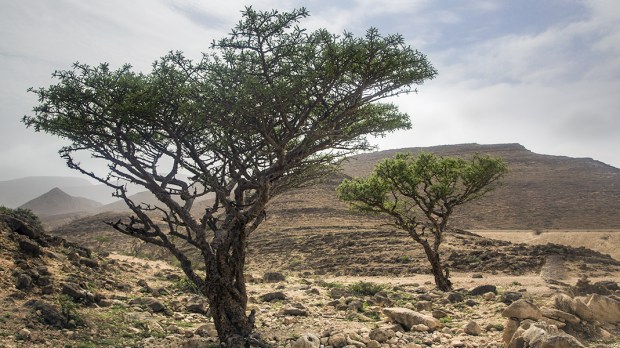Lenten Campaign 2025
This content is free of charge, as are all our articles.
Support us with a donation that is tax-deductible and enable us to continue to reach millions of readers.
One of the three gifts the Magi presented to the infant Jesus at the Nativity is facing an uncertain future. Frankincense, a commodity that has been traded for thousands of years, may soon be hard to find as the trees it is harvested from are in decline. The troubles have arisen due to several factors, including exploitative harvesting practices and climate change.
Frankincense is an aromatic resin that is used in church incense as well as an ingredient for perfume. The resin is harvested from the Boswellia tree, of which there are five species that produce varying grades. In 1998, the primary frankincense–producing species, Boswellia sacra, was labeled “near threatened.” By 2019, however, things had not improved.
Now a report from Catholic News Service, provided by Crux, suggests that the threatened tree could go extinct within 50 years. Experts warn that if measures are not taken to ensure the Boswellia’s survival, then resin production could be down by as much as 50% in just 20 years.
Anjanette DeCarlo, chief sustainability scientist for the Aromatic Plant Research Center, explained that one problem is that the trees are not reproducing as they once were. Many of the trees that are currently producing resin are considered the last of their generation. As they are fewer in number than ever, they are often “over-tapped,” with shorter periods of rest to regenerate the harvested resin. DeCarlo urged immediate action, cautioning that “Ten years from now will be too late.”
What can be done?
Although the situation is dire, DeCarlo noted that there are ways to reverse the current trend. These include more ethical harvesting practices, as well as the implementations of new technologies that would be gentler on the trees. For this, DeCarlo suggested that the Catholic Church should take a more active role in protecting these invaluable trees. She said:
Without such controls the industry is “very open to corruption and/or decline,” and “it’s not helping the people on the ground, it’s not helping the companies that want to do the right thing” and it doesn’t help the consumers who “don’t want to be killing trees or hurting communities or being complicit in something that isn’t sustainable,” DeCarlo added, “We desperately need the Catholic Church to step in.”

Read more:
Why did the Magi bring gifts of gold, frankincense and myrrh?

